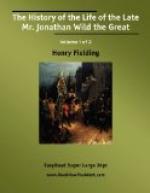But, though he would not give himself the pains requisite to acquire a competent sufficiency in the learned languages, yet did he readily listen with attention to others, especially when they translated the classical authors to him; nor was he in the least backward, at all such times, to express his approbation. He was wonderfully pleased with that passage in the eleventh Iliad where Achilles is said to have bound two sons of Priam upon a mountain, and afterwards to have released them for a sum of money. This was, he said, alone sufficient to refute those who affected a contempt for the wisdom of the ancients, and an undeniable testimony of the great antiquity of priggism.[Footnote: This word, in the cant language, signifies thievery.] He was ravished with the account which Nestor gives in the same book of the rich booty which he bore off (i.e. stole) from the Eleans. He was desirous of having this often repeated to him, and at the end of every repetition he constantly fetched a deep sigh, and said it was A glorious booty.
When the story of Cacus was read to him out of the eighth Aeneid he generously pitied the unhappy fate of that great man, to whom he thought Hercules much too severe: one of his schoolfellows commending the dexterity of drawing the oxen backward by their tails into his den, he smiled, and with some disdain said, he could have taught him A better way.
He was a passionate admirer of heroes, particularly of Alexander the Great, between whom and the late king of Sweden he would frequently draw parallels. He was much delighted with the accounts of the Czar’s retreat from the latter, who carried off the inhabitants of great cities to people his own country. This, he said, was not once thought of by Alexander; but added, perhaps he did not want them.
Happy had it been for him if he had confined himself to this sphere; but his chief, if not only blemish, was, that he would sometimes, from an humility in his nature too pernicious to true greatness, condescend to an intimacy with inferior things and persons. Thus the Spanish Rogue was his favourite book, and the Cheats of Scapin his favourite play.
The young gentleman being now at the age of seventeen, his father, from a foolish prejudice to our universities, and out of a false as well as excessive regard to his morals, brought his son to town, where he resided with him till he was of an age to travel. Whilst he was here, all imaginable care was taken of his instruction, his father endeavouring his utmost to inculcate principles of honour and gentility into his son.
CHAPTER FOUR
Mr. Wild’s first entrance into the world. His acquaintance with count La Ruse.




